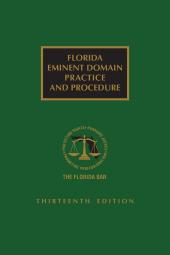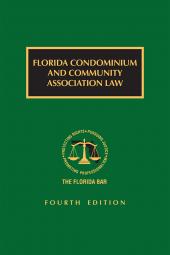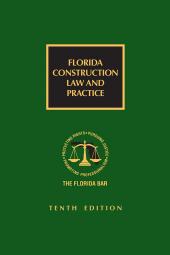Florida Eminent Domain Practice and Procedure
Select a format
 International Order Inquiry
International Order Inquiry
Select subscription type
Terms & conditions
Subscribers receive the product(s) listed on the Order Form and any Updates made available during the annual subscription period. Shipping and handling fees are not included in the annual price.
Subscribers are advised of the number of Updates that were made to the particular publication the prior year. The number of Updates may vary due to developments in the law and other publishing issues, but subscribers may use this as a rough estimate of future shipments. Subscribers may call Customer Support at 800-833-9844 for additional information.
Subscribers may cancel this subscription by: calling Customer Support at 800-833-9844; emailing customer.support@lexisnexis.com; or returning the invoice marked "CANCEL".
If subscribers cancel within 30 days after the product is ordered or received and return the product at their expense, then they will receive a full credit of the price for the annual subscription.
If subscribers cancel between 31 and 60 days after the invoice date and return the product at their expense, then they will receive a 5/6th credit of the price for the annual subscription. No credit will be given for cancellations more than 60 days after the invoice date. To receive any credit, subscriber must return all product(s) shipped during the year at their expense within the applicable cancellation period listed above.
The total price includes the product(s) listed in the Order Form and any Updates for a limited period (minimum period of 30 days) after the order is placed ("Order Window"). Shipping and handling fees are not included in the grand total price.
All shipments may be returned, at subscribers' expense, for full credit of the Price within 30 days of receipt.
Shipments may not be returned, and no credits will be issued, more than 30 days after receipt.
After the Order Window, subscribers will receive notice of Updates along with the then-current grand total price and order process as Updates become available. Subscribers will only be shipped those Updates they specifically request.
Product description
View a sample of this title using the ReadNow feature
When can government "take" private property for a "public" purpose? Can private property owners obtain restitution for partial takings and business damages? This manual is a comprehensive treatment of current legal practice, including detailed review of proceedings from both the condemnor's and condemnee's perspective. In addition to updated rules, statutes and recent case law, the latest edition offers.
- Additional case law on:
- Expert testimony, including cases discussing the Daubert standard for admission of expert testimony
- Inverse condemnations, including recent United States Supreme Court decisions
- The Bert Harris Act
- Attorney's fees for both "benefits achieved" and supplementary proceeding awards
- What constitutes a compensable taking
- Mediation - New forms (Motions) in the Mediation chapter, and additional discussion about providing constructions plans et al. prior to mediation and incorporating those plans into the mediation agreement. Also, special considerations in mediation for design-build projects
- Extensive discussion on the recent amendments to the Bert Harris Act, including changes to the ability to recover attorney's fees.
- Discussion of the free speech implications in the exercise of property rights, specifically as to residential architectural design.
The 12th Edition ISBN was 9781663320544.
Visit our Real Property website for a complete list of The Bar's Rules of Procedure related titles.
Visit The Florida Bar Legal Publications website for a complete list of The Bar's titles.
eBooks, CDs, downloadable content, and software purchases are noncancelable, nonrefundable and nonreturnable. Click here for more information about LexisNexis eBooks. The eBook versions of this title may feature links to Lexis+® service for further legal research options. A valid subscription to Lexis+ is required to access this content.
Table of contents
Chapter 1. Introduction
D. Tobyn DeYoung
Chapter 2. Power Of Eminent Domain
Paul D. Bain and W. Campbell McLean
Chapter 3. Public Purpose Doctrine
S. Cary Gaylord and A. J. Jim Spalla
Chapter 4. Necessity For The Taking
Lorena H. Ludovici
Chapter 5. Initiating Condemnation Lawsuit By Condemnor
Prineet D. Sharma and Andrew DeNering
Chapter 6. Procedural And Substantive Defenses, And Defensive Pleadings
Gregory S. Rix and Summer E. DeGel
Chapter 7. Order Of Taking
D. Tobyn DeYoung, Thomas Goldstein,and Jim Helinger, Jr.
Chapter 8. Pretrial Procedures And Preparation For Trial Or Settlement
Thomas P. Callan and Dean R. DiRose
Chapter 9. Compensation
Brian P. Patchen and John C. Lukacs, Sr.
Chapter 10. Eminent Domain Mediation
Joe W. Fixel, William A. Fixel, and Jim Helinger, Jr.
Chapter 11. Trial
Charles S. Stratton, Joshua S. Stratton, and Robert S. Yerkes
Chapter 12. Jury Instructions
Hon. Andrea Teves Smith and Andrew G. Diaz
Chapter 13. Posttrial Procedure
John W. Little III
Chapter 14. Inverse Condemnation
S. William Moore and Ryan C. Reese
Chapter 15. Appeals
Raymond Thomas (Tom) Elligett, Jr., Amy S. Farrior, and Shirley T. Faircloth
Chapter 16. Tax Considerations In Eminent Domain Proceedings
Bradley R. Gould and Owen Evans
Chapter 17. Distinctions Between Florida And Federal Practice
Blake H. Gaylord
Chapter 18. Benefits And Allowances Under Federal And State Programs
Joseph Bracken and D. Mark Natirboff
Chapter 19. Environmental Concerns
Darrell W. Payne, John J. McNally, and Carl Eldred
Chapter 20. Statutory Private Property Rights Protection
Roberto M. Vargas
Chapter 21. Constitutional Protection Of Property Rights
Joanne M. O'Connor
INDEXES
Citations
Cases
Subjects
 Lexis Nexis
Lexis Nexis 


